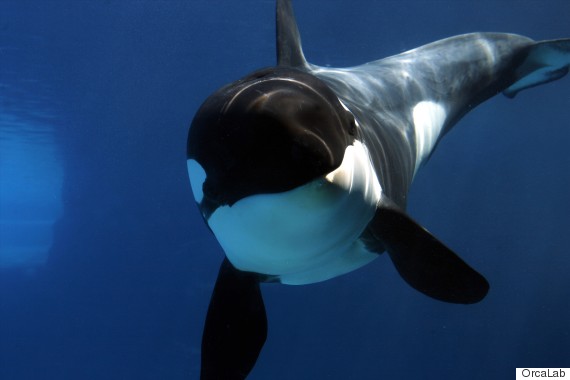Image may be NSFW.
Clik here to view.
The days of staring at animal live cams, waiting for something to happen are over. A B.C. whale research station actually has a system that will text your phone when there's movement in Johnstone Strait.
Those waters off northern Vancouver Island are home to more than 150 orcas in the summer when they feed and give birth. Until now, mostly researchers and volunteers have been privileged to see the whales in all their glory.
But this week, six cameras began live-streaming from Hanson Island, thanks to the OrcaLab research organization and philanthropic media group, explore.org.
Established in 1972 by Dr. Paul Spong, OrcaLab studies whales in the wild without interfering with their natural habitat. It developed a network of remote hydrophones to monitor orcas using their sounds.
It will also text you when the whales are active and on camera. So that you can run to your computer and catch scenes like this:
Image may be NSFW.
Clik here to view.
Or this. Hello!!!
Image may be NSFW.
Clik here to view.
OrcaLab had set up a webcam in 2000, but the new partnership with explore.org provides six cameras from different angles, including underwater:
Two other cameras are mounted above an area where orcas do their "beach rubbing." The behaviour is specific to northern resident whales who make shallow dives to the bottom and rub their massive bodies over pebbles.
Image may be NSFW.
Clik here to view.
"Every day you tune into a live cam and observe the natural world in its purest form, you are a scientist," said Charlie Annenberg, founder of explore.org, which also runs live cams of pandas in China and wildlife along a river in Kenya.
"You can take this science as far as you please," he added. "You can use the live cams to escape stress and simply soothe your soul, to participating in live lectures. You could study the recorded footage and actually become one of the most advanced field scientists in the world."
Check out some of the images captured by the live cams:
Image may be NSFW.
Clik here to view. Like Us On Facebook
Like Us On Facebook
Image may be NSFW.
Clik here to view. Follow Us On Twitter
Follow Us On Twitter
Image may be NSFW.
Clik here to view. Follow Us On Instagram
Follow Us On Instagram
Clik here to view.

The days of staring at animal live cams, waiting for something to happen are over. A B.C. whale research station actually has a system that will text your phone when there's movement in Johnstone Strait.
Those waters off northern Vancouver Island are home to more than 150 orcas in the summer when they feed and give birth. Until now, mostly researchers and volunteers have been privileged to see the whales in all their glory.
But this week, six cameras began live-streaming from Hanson Island, thanks to the OrcaLab research organization and philanthropic media group, explore.org.
Established in 1972 by Dr. Paul Spong, OrcaLab studies whales in the wild without interfering with their natural habitat. It developed a network of remote hydrophones to monitor orcas using their sounds.
It will also text you when the whales are active and on camera. So that you can run to your computer and catch scenes like this:
Image may be NSFW.
Clik here to view.

Or this. Hello!!!
Image may be NSFW.
Clik here to view.

OrcaLab had set up a webcam in 2000, but the new partnership with explore.org provides six cameras from different angles, including underwater:
Two other cameras are mounted above an area where orcas do their "beach rubbing." The behaviour is specific to northern resident whales who make shallow dives to the bottom and rub their massive bodies over pebbles.
Image may be NSFW.
Clik here to view.

"Every day you tune into a live cam and observe the natural world in its purest form, you are a scientist," said Charlie Annenberg, founder of explore.org, which also runs live cams of pandas in China and wildlife along a river in Kenya.
"You can take this science as far as you please," he added. "You can use the live cams to escape stress and simply soothe your soul, to participating in live lectures. You could study the recorded footage and actually become one of the most advanced field scientists in the world."
Check out some of the images captured by the live cams:
Image may be NSFW.
Clik here to view.
 Like Us On Facebook
Like Us On FacebookImage may be NSFW.
Clik here to view.
 Follow Us On Twitter
Follow Us On TwitterImage may be NSFW.
Clik here to view.
 Follow Us On Instagram
Follow Us On Instagram -- This feed and its contents are the property of The Huffington Post, and use is subject to our terms. It may be used for personal consumption, but may not be distributed on a website.